Manchester by the Sea Review
Another Great Boston Film
Released : January 13th 2017
Certificate : 15
Director : Kenneth Lonergan
Cast : Casey Affleck, Michelle Williams, Kyle Chandler, Lucas Hedges
Plot : Lee Chandler (Affleck), a handy man working in Manchester, has his life turned upside down by the death of his brother (Chandler).
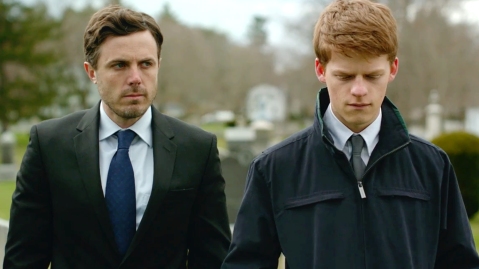 Kenneth Lonergan returns as writer director of one of this year’s Best Picture hopefuls, Manchester by the Sea. Lonergan has proved himself in the Academy’s eyes before, receiving nominations for his screenplays for the little know You Can Count on Me, and the famous Scorsese period gangster film, Gangs of New York. The film stars relative new comer Lucas Hedges has had very smaller roles till now, supporting in films such as The Zero Theorem and Moonrise Kingdom. However has proved to be one of the biggest surprises of the awards season.
Kenneth Lonergan returns as writer director of one of this year’s Best Picture hopefuls, Manchester by the Sea. Lonergan has proved himself in the Academy’s eyes before, receiving nominations for his screenplays for the little know You Can Count on Me, and the famous Scorsese period gangster film, Gangs of New York. The film stars relative new comer Lucas Hedges has had very smaller roles till now, supporting in films such as The Zero Theorem and Moonrise Kingdom. However has proved to be one of the biggest surprises of the awards season.
The story is a pure character drama, with characters which are both relatable and original enough to be engaging. The character, as with many Boston set dramas, may not win the audience over immediately, but ultimately become very memorable cinematic characters. The story arc is masterfully told, allowing for backstory to be tastefully spoon fed into the present events and the creation of several beautiful character arcs. The film is lengthy, and the topic matter sombre and dry in parts, but the script and dialogue so well crafted, that the film is a rare drama that feels authentic and is engaging. The story has such an emotional spectrum, which is executed brilliantly. Amazing humour is sprinkled into the film throughout as a fitting way to keep the film grounded and enjoyable.
To address Lonergan contribution, in this award climate it wouldn’t be surprising if his directing efforts went unrewarded. With the likes of Villeneuve, Gibson and Chazelle dealing with larger than life stories and presenting with such flare and spectacle, the subtle work of Lonergan may be forgotten directorally. But this is a shame as the warmth and heartbreak that Lonergan is able to convey, and perfectly capture character drama, is a gem. If it isn’t cliché to say, from the opening shot, the films presentation has passion and calculation. Lonergan skills as a screenwriter are amazing, building characters and their exchanges which are some of the most engaging and life like this year. Hence making the Screenplay Oscars a coin flip between this and Hell or High Water. Not just the main characters but all supporting casts lines, contribute to the story and represent genuine human traits. Not a throwaway line exists within this film, making it a drama that could be enjoyed for hours.
And to round off the growing merits of the film, the performances are stunning. Casey performance for some, as with the majority of his work, may be viewed as underplayed. But the effect made the character much more lifelike, Lee’s emotions aren’t overplayed, or exaggerated to make the drama more engaging. Instead, much alike the script, the acting is subtle which makes for a more authentic cinematic experience. Lucas Hedges role as well is stunning honest in his acting, bringing to life a tricky character who initially may seem shallow, but develops. Michelle Williams is able to bring so much to the film is so few scenes, absent for probably eighty percent of the film, she is still memorable walking out of the theatre.
Manchester by the Sea is an amazing feat of character drama. Each viewpoint and emotion that is delivered by the script and the acting is understandable and emphatic on some level. It is a film with a subtle current, which ultimately pulls you in. While the story line may be one of the saddest of the award season, this is balanced by the amazing sense of humanity and warmth that the actors and script bring to the film.
Verdict : A few with few flaws. It takes the theme of grief and is able to actualize it with such precision and skill. Plus a heartfelt ending, great humour and amazing performances.
Verdict : 5/5
Quote : “I can’t beat it. I can’t beat it. I’m sorry.”
I, Daniel Blake Review
The Pursuit Of Happyiness
Released : October 21st 2016
Certificate : 15
Director : Ken Loach
Cast : Dave Johns, Hayley Squires, Natalie Ann Jamieson, Micky McGregor
Plot : Daniel Blake (Johns) struggles with the complexities and harshness of the welfare system after a major heart attack. Seemingly unable to qualify for benefits, alike single mother (Squires), together they face poverty.
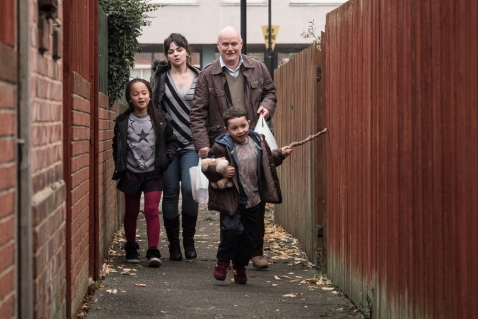 Ken Loach, the quietly famous British director famous for the classic Kes, reunites with frequent collaborating writer Paul Laverty. Together their most famous work includes The Wind that Shakes the Barley, and more recently The Angles’ Share, and now I, Daniel Blake. Ken Loach in his most famous for his films about the everyday British citizen, within different stories. Often Loach’s film have a humorous edge but ultimately poetic sadness to them, the style which has made him famous. While his other films, alike with Laverty has a slight quirky edge to the story that accompanies the social commentary aspects of the film, I, Daniel Blake doesn’t contain such uniqueness or quirky edge. It is a straightforward social commentary about the poor suffering with the benefit system of Britain, told through a humours melodramatic tone and subtly directing and writing.
Ken Loach, the quietly famous British director famous for the classic Kes, reunites with frequent collaborating writer Paul Laverty. Together their most famous work includes The Wind that Shakes the Barley, and more recently The Angles’ Share, and now I, Daniel Blake. Ken Loach in his most famous for his films about the everyday British citizen, within different stories. Often Loach’s film have a humorous edge but ultimately poetic sadness to them, the style which has made him famous. While his other films, alike with Laverty has a slight quirky edge to the story that accompanies the social commentary aspects of the film, I, Daniel Blake doesn’t contain such uniqueness or quirky edge. It is a straightforward social commentary about the poor suffering with the benefit system of Britain, told through a humours melodramatic tone and subtly directing and writing.
The first issue with I, Daniel Blake (as with the rest of Loach’s films) is that they don’t exactly enthral the average cinema goer. Loach makes slow paced subtle films that a rooted in clarity of character and dry directing. In other words, the films stay rooted in realism, and when this feature is carried to such extent such as with I, Daniel Blake, it can create issues with pacing. While the film isn’t particularly long, the very dead pan style of its storytelling, means that at some times the humours sweary nature of lead character doesn’t maintain a throughout entertaining sensation. This is where I, Daniel Blake differs from Loach’s other films, as the unusual, inventive or intense situations that the characters find themselves in is dropped, meaning that his style of filmmaking can become tedious at times.
Luckily it contains enough of the essential Loach elements to make it enjoyable. One being that Loach can find actors that aren’t mainstream and that fit characters like a glove, the two actors being Dave Johns and Hayley Squires. While the performances aren’t of the quality to make them hugely memorable, they are very enduring and what is most important about a Loach film, very realistic. With this realism means that there aren’t hugely emotional scenes that demand great floods of tears, as in mainstream Hollywood dramas, and for this reason may not seem as impressive as others. However, the two actors, Squires in particular disappears into these characters, and this joined with Loach’s directing style completely immerse you in their reality. It is likely for such reason, why the film comes across monotonous and dim, because this is their reality.
Loach’s style of directing and the overall craft of the film is very subtle, but effective in this pursuit of realism. There are many sequences where the audio is drowned out by the hustle and construction sounds going on around the characters, to help build the world of working class Britain. Similarly, Laverty script which contains little exchanges and idioms of the characters equally construct the setting of Newcastle. What is most poignant about Loach’s style, is the way he doesn’t show everything. He is a very selective director and will linger on certain shots longer than perhaps other directors would do. Many of the scenes take place in the council housing and Loach plays of this via shooting through doorways frequently to show the scene and characters. This sells the cramped and limited existence of the characters. The direction does become slightly repetitive, as the walking of characters, indoor scenes and emotive scenes are all shot in a separate way and rarely deviate. So, Loach style which is sombre enough as it is, when joined with such a bleak story does create a very dreary picture. While this is the aim of the film as it attempts to reflect the reality of these characters, it doesn’t quiet have the stirring drama and humour to heighten the film to a captivating as well as poignant drama. But there is great skill across the board to immerse the audience in this world as to convey the story and point.
Verdict : The film creates a excellent level of affinity with the characters and the world, but moving and humour elements are few and far between to make the film stand out, as realistic as it is.
Verdict : 3/5
Quote : “Run the mouse up the screen.”
The Hustler DVD Review
Pool Hand Luke
Released : October 27th 1961
Certificate : 15
Director : Robert Rossen
Cast : Paul Newman, Jackie Gleason, Piper Laurie, George C Scott, Myron McCormick
Plot : The story of ‘Fast’ Eddie Felsen (Newman), a top of his game pool hustler who’s been making good money on the road. But when he challenges Minnesota Fats (Gleason), the rumoured best pool player in the country, and meets a shy girl called Sarah, things get difficult.
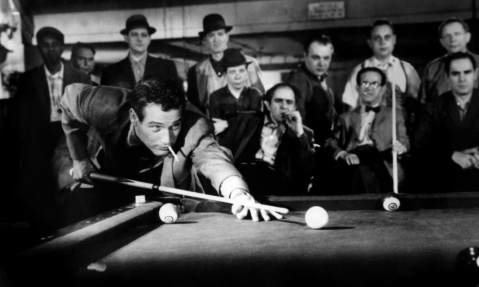
The Hustler is another ‘classic’ to be made out of a Paul Newman lead. The film has big respect amongst filmmakers, enough that Martin Scorsese directed a sequel to the film called The Colour of Money, with Newman returning to the role of Fast Eddie. It gained one Oscar for cinematography, and six additional nominations that included all of the four main actors for their roles as well as best picture. While Newman in his earlier career had films much more noted than this, this was one of his very earliest, coming before Cool Hand Luck and Butch Cassidy and the Sundance Kid.
From the general synopsis of the film you’d expect to see a drama based on a series of dramatic pools games, the film devoting much time to the drama of different games in isolation as he Eddie works his way to the top. While the film does contain this, there is a more prevalent storyline that occupies the majority of screen time. This is the story of Eddie’s relationship with Sarah which takes an unvarnished look at alcoholism, loneliness and depression. So for all the charm and charisma of Newman as an actor, the taste to this film may be surprising. For the romantic relationship of these two characters, the writing is realistic in the way that it is economic and understated. The script doesn’t contain clichés (for the time it was made) and doesn’t over-dramatize the topic matter dealt with. The result of which are characters that you may not ‘like’ or approve of, but this is a result of writing that is not hyperbole and is true to the characters (a line doesn’t feel out of place or made for memorabilia value).
For the acting across the board it ticks all of the boxes that are needed for great drama. The lead from Newman is as brilliant as ever, although it does fall into vibe of the rest of his characters in a career that’s slightly type cast. But the character development that his role goes through and that he is able to realize is superb, to really convey a character that is a changed man by the end of the story. The supporting performances are a great match to Newman as well. Gleason performance who plays Minnesota Fats, a confident and collected pool player who has been the best for years, is very entertainingly realized, but with a slightly rushed character arc. C Scott, who plays the manager of Fats, a rich but determined businessman, is the biggest standout next to Newman who grounds a performance with a gripping arc, despite being borderline over the top in some scenes.
Piper Laurie’s performance may not be as acclaimed, due to the characters weak cautious nature, which at times become tedious. But despite this Laurie very well captures a deflated character with little enthusiasm, a hard character to get behind but a well-acted on none the less. So The Hustler isn’t the engrossing sports drama in the way that many would expect, with an abundance of gripping pool room game scenes with poignant dialogue. Instead it is engrossing due to its flawed and ‘damaged goods’ characters which have brilliant arcs (which for their time would have been much more original than today) and performances that make it a standout character study piece.
Verdict : A sports drama that would seem dated made today likely, with pacing that will drag for some audiences. The performances and the script elevate the film beyond these flaws, in a slow burning melancholy drama.
Verdict : 4/5
Quote : You have the best excuse in the world for losing; no trouble losing when you got a good excuse.
Zero Dark Thirty DVD Review
US The Office
Released : January 25th 2013
Certificate : 15
Director : Kathryn Bigelow
Cast : Jessica Chastain, Jason Clarke, Jennifer Ehle, Kyle Chandler, Mark Strong, Édgar Ramírez
Plot : After 9/11, the US army and CIA launch the largest man hunt in history to find all those responsible for the deaths of 3,ooo civilians. The story follows the working of Maya (Chastain), who starts out as a CIA high achieving office clerk, but is sent to Pakistan to work as a front line investigator.
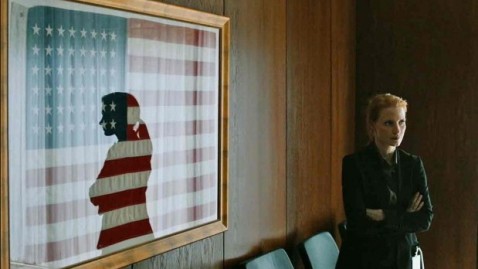
The directing writing duo that brought the moral panic of Iraq warfare to ultra-realism level with The Hurt Locker, attempt to bring the same level of realism to another side of the conflict, the wider picture fought behind desk and in offices. Bigelow and Mark Boal take their talent to a film which unpacks on the quantity of battle/tense scenes and the solider mentality, and replaces it with the tedious and frustrating ten-year governmental viewpoint. So what could audience expect going into this, a still large presence of set piece thrills that made their previous work famous, unbiased story telling that shies away from any political messages, and a dependence of character driven drama interwoven in the true story being told. Well for ZD30 a tighter lip attitude towards the character development for sure, as this is traded in for scope of story and (almost) all acting credit and audience investment resting upon Chastain character. So for audience members who revealed in the unique and thought provoking solider character drama, that was of a quality that matched that of set piece thrills that the film provided, their might be disappointment. As quantity on this aspect of the film is traded in, for the creation of a huge scoping ‘how done it’ rather than ‘who done it’ tale.
For the overall feel vibe and story arc of the film, it does have to deal with the weight of an over two and a half run time that for the majority is set behind desks and in offices. For this reason, some audiences will have the same level of difficulty as they do with many unflinching true story films, such as Spotlight (although that film was much more character driven). Mark Boal writing demonstrates his great diversity, as previously being able to craft dialogue for small skirmish warfare, and now to encompass a decade man hunt. Due to this setting more rides on Boal then Bigelow, as the office space environment provides little breathing space for her talents. Her signature shaky camera movement and obscured camera shots added little to office staged antics, luckily she has her chance to shine in a sprinkling of set conflict sequences and handling of torture sequences. Boal keeps the film grounded in subtle, subtlety dramatized character development, specialist technical meeting dialogue, and the right amount of character conflict and emotional exchange to recreate the trademark realism that was present in The Hurt Locker with not a pitch feeling dramatics or overly emphasised. This is the talent lacking in the bio-pic and true story genre of late.
To address Bigelow addition to the film, her craft work is most noticeable present within the torture scenes, (and to avoid spoilers what will be referred to as) the Camp Chapman scene and the famous talked about final sequence of the film, which is the raid in Abbottabad. From these scenes and others Bigelow keeps audiences (as with previous work) in the palm of her hand, with any many outdoor sequences of the film keeping you edging forward with anticipation that something will go off. This effect is partly present in her previous work, where she in effect turned explosions into basically jump scares, which hit much harder than any horror genre attempt. The close to home topic and tension that is derived from this film keeps audience in an unpleasant state of fear and unease about the film, as it should do. Contrary to popular opinion of the final act of the film, it isn’t the tense’s sequence ever (due to a combination of knowing the outcome and an intent to maintain the films overall ultra-realism, which does get in the way of the thrills), but it does prove to be the best shot sequence of the film. Alike the opening of Spectre, the opening exceptionally thrilling, but was a stunning sceptical of directorial talent.
Jessica Chastain carries a large weight of the film as Jeremy Renner did in The Hurt Locker, as being both the most interesting and dominate character, with all other roles to a large degree being reactionary to her/him. This is not to say that supporting performances lack, Kyle Chandler pulls off yet another underrated performance as Chastain’s manager in the field, and Jason Clarke keeps for the most part a charismatic character grounded in the film. Mark Strong’s speech boasted in the trailers in another highlight of the supporting cast contributions also worthy of mention. But Chastain is, as she needed to be, the runaway from this film. As due to her brilliant performance, the film succeeds at its ability to make this ten-year national manhunt, be reduced to a very personal obsessive quest of one person, Chastain’s character. She was very worthy of the nomination she gained, and she likely missed out to Lawrence due to the lacking in areas of quantity of emotional outburst and uniqueness of character. As the final shot of the film fades out on Chastain’s face it perfectly encompasses the level of relief and exhaustion felt after a burning passion and obsession lasting ten years. Additionally, the performance has the great look of a genuine character development, as she become consumed by the job as the film progresses.
Zero Dark Thirty is a refreshing gritty piece of award bait, which doesn’t appeal to a wide audience. These two factors of award bait and niche appeal is most likely why it hasn’t quiet stood the test of time as far as peoples appreciation and memory for the film. What this in the end boils down to, is the weakness of the film having a large run time and a desire to enrapture realism, with only a selected few scenes to shift you forward in your seat. But for a large degree the script from Mark Boal keeps the film in a perfect blend of believable and dramatically entertaining, which pulls the film out of danger of dullness. But it can be appreciated that this feeling will not be universal, resulting in a slight Marmite film which asks its audience to observe mostly subtle (ironically for the topic matter) film, and to a degree is much alike Spotlight, ultra-realistic, with a sharp topic and stunning performances.
Verdict : 4/5
Verdict : A slow burner for sure, but has so much to offer with writing, acting and direction (in the order, first being the best). You don’t quite get the emotion for thrills of her previous work, but that is down to subject matter, not any lack of skill.
Quote : “I’m the motherfucker that found this place. Sir.”
Review: Passion
Year: 2012
Certificate: 15
Director: Brian De Palma
Screenwriter: Brian De Palma
Cast: Rachel McAdams, Noomi Rapace, Karoline Herfurth, Paul Anderson

Passion charts the toxic relationship of predatory advertising executive Christine (Rachel McAdams) and her shy but sharp subordinate Isabelle (Noomi Rapace). As their amicable dynamic gradually becomes poisoned by jealousy, betrayal and ambition both professional and personal, Isabelle finds herself accused of a terrible crime.
An English-language remake of 2010’s Love Crime, De Palma weaves a well-made if irredeemably pulpy tale of executive backbiting. Saturated in bright colours, dark shadows and consecutive Dutch angles, the cinematography reflects the heightened nature of the connection between Christine and Isabelle, by turns erotically charged, heady and- ultimately- deadly. McAdams is on top form here, although her casting has an unfortunate side effect of framing the film as an almost-plausible ‘10 years on’ scenario for her poisonous teen diva Regina George from 2004’s Mean Girls. Similar to George, Christine is a committed life-ruiner, her charming facade hiding an impressively sadistic personality. Rapace also excels playing the apparent ingénue who comes to take her role as Christine’s protégée perhaps more literally than Christine intended.
Riffing heavily on the connection between professional ambition and romantic desire, De Palma perhaps oversteps the mark a little, ultimately coming off more schlocky than sinister. The much trailed girl-on-girl eroticism is aimed squarely at a hetero male audience, and the framing of the career ambitions of its female characters as cut-throat, two-faced and irrevocably intertwined with their sexuality betrays an ambivalence towards women that feels at best old-fashioned.
Verdict: 2/5
Image credit: imdb.com
Mini review: Freeheld
Year: 2015
Certificate: 15
Director: Peter Sollett
Screenwriter: Ron Nyswaner
Cast: Julianne Moore, Ellen Page, Michael Shannon, Steve Carell
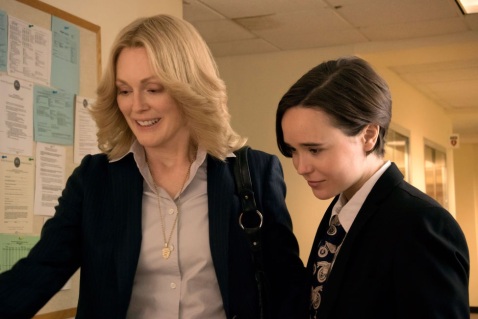
Julianne Moore stars as Laurel Hester, whose struggle to transfer her police pension to her partner Stacie Andree (Ellen Page) in the wake of Laurel’s terminal cancer diagnosis had a lasting impact on gay rights in the States. Despite excellent central performances from Page and Moore, the by-the-numbers screenplay and straightforward direction leave Freeheld feeling ultimately televisual. Frustratingly, the civil rights element and domestic drama element seem to jostle for position, each ultimately undermining the other as Laurel and Stacie’s relationship is not allowed sufficient screen time before the cancer diagnosis and subsequent legal struggle (with the supporting characters it brings in) become the central focus of the narrative.
Verdict: 3/5
Image: Fandango.com
BFI Flare review: The Girl King
Year: 2015
Certificate: 15
Director: Mika Kaurismäki
Screenwriter: Michel Mark Bouchard
Cast: Malin Buska, Sarah Gadon, Michael Nyqvist, Patrick Bauchau
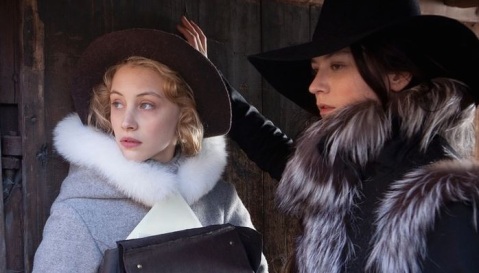 Amid the Catholic-Protestant conflict raging throughout 17th century Europe, Kristina (Malin Buska), only child of the late King Gustav II of Sweden, is raised under the watchful eyes of Sweden’s Lutheran court and it’s chancellor, Axel Oxenstierna (Michael Nyqvist). However, when Kristina comes of age and begins to rule as queen, her* radical proclamations and unconventional conduct in private cause tensions within the court.
Amid the Catholic-Protestant conflict raging throughout 17th century Europe, Kristina (Malin Buska), only child of the late King Gustav II of Sweden, is raised under the watchful eyes of Sweden’s Lutheran court and it’s chancellor, Axel Oxenstierna (Michael Nyqvist). However, when Kristina comes of age and begins to rule as queen, her* radical proclamations and unconventional conduct in private cause tensions within the court.
A Sweden-Canada co-production, The Girl King is a valiant if ultimately flawed attempt to illustrate the life of an extremely unusual monarch. Buska, already a well-known theatrical actress in Sweden, is a perfect choice for the intelligent and rakish Kristina, and is a commanding screen presence. However, one can’t help wonder if she is being held back slightly by the requirements of performing in a second language (other than the occasional exchange in French, the film is spoken in English), as her delivery of the lines doesn’t quite equal the exquisite subtlety of her facial expressions. Michael Nyqvist (known for the Swedish Girl With the Dragon Tattoo trilogy) does admirable work here as Sweden’s Chancellor, showing a surprising deftness in the more comic moments. The exchanges between Axel and Kristina, particularly when he is trying to delicately approach the subject of her tomboyish nature, are some of the best scenes in the film. Other highlights are Sarah Gadon as Kristina’s love interest, Countess Ebba Sparre, and Patrick Bauchau as the French philosopher René Descartes, with whom Kristina strikes up a correspondence which scandalises the pious members of her court (while Sweden and France had a mutual enemy in Germany, France’s allegiance to the Pope made their truce an uneasy one).
Despite the quality of the acting and some clever cinematography courtesy of Guy Dufaux, The Girl King ultimately feels a little ramshackle. Bouchard’s screenplay makes much of Kristina’s love for Ebba, and while it’s refreshing to see such an unapologetically queer historical figure pursuing their desires, the arc of Kristina and Ebba’s romance feels clichéd and despite an elegant turn from Gadon as a character Ebba is paper-thin. Indeed, even Kristina’s crisis of faith- surely hugely important for her as a character- feels glossed over here, and this lack of achievement of the script in really getting under her skin leaves the whole piece feeling too light. This, coupled with the slightly uneven tone where moments of high camp sit uncomfortably next to overwrought emotional scenes, serves to eject the audience from the narrative. A few moments of sloppy editing further underscore these problems.
All in all The Girl King feels like a film which is punching below its weight somewhat. However, there is still much to like here, particularly given the dearth of LGBT historical figures represented on screen. The narrative holds together well enough to showcase the film’s stronger components, and if this is Malin Buska’s Hollywood calling card she will certainly be one to watch in the future.
Verdict: 3/5
BFI Flare is the British Film Institute’s annual LGBT film festival in London. More information about the festival can be found here.
*A note on pronouns: in terms of the historical record, there seems to be a fair amount of debate between academics over both Kristina’s gender and sexuality, with varied theories suggesting Kristina may have been any one of what we now know as gay, bisexual, transgender or intersex. As there is little historical consensus on this, and as the film portrays her fairly unwaveringly as a cis lesbian, I have used female pronouns in my review. If this is a problem let me know and I can edit to gender neutral. Many thanks to my historian friend Katie for doing some academic investigation into Kristina’s history.
Image credit: facebook.com/TheGirlKingFilm
Enemy DVD Review
Spider Man 2
Released : February 7th 2014
Certificate : 15
Director : Denis Villeneuve
Cast : Jake Gyllenhaal, Mélanie Laurent, Sarah Gadon
Plot : A history teacher, Adam Bell (Gyllenhaal), lives a monotonous repetitive life. One day at work out of the blue a co-worker recommends a film to him, while watching it Adam discovers an extra who is physically identical to him. He takes it upon himself to investigate and meet his double.
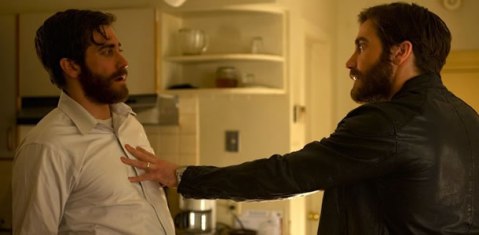
Denis Villeneuve and Jake Gyllenhaal second team up of 2013, however this one went hugely unnoticed, surprisingly given the huge critical acclaim and audience praise their other film Prisoners received that year also. But this film did not come with half as much advertising or marketing that Prisoners did, and after seeing the film unaware of the moderate level of chatter that it received due to its confusing nature, it is clear why. As stated, watching it so late after release and completely unaware of the excitement it caused for a niche amount of fans and critics, it gave great perspective. It also made it possible to research the speculations behind the films meaning after viewing to piece together the metaphorical meanings behind the film, and most poignantly the ending. As a film that has gained attention only due to its murky hidden meanings and shocking ending, I high recommend this video which gives a very detailed explanation for everything in the film, but it does contain huge spoilers as well so view film before viewing video https://www.youtube.com/watch?v=v9AWkqRwd1I Understanding of the films hidden themes in my opinion is vital to enjoying the film to a greater level, as there a specific meanings to the film, it is not polysemic or open to interpretation.
The film is by no means a straight doppelganger feature, as I was expecting, viewing purely out of respect for the actor and director. If a straight doppelganger is what is desired, then The Double will make for much more grounded and clean cut thriller about identity issues, despite its striking directing and cinematography. Regardless of fully understanding the film on first viewing or not, it will undoubtedly make an impression on the viewer. It is easy to see why many might instantly dismiss the film due to its unsettling nature and very dark moody themes. Equally upon the discovery of the films hidden meanings, many could easily reject the film still due to its unapologetically obscure way to deliver its message (which many could claim is deliberately obscure for the sake of gaining attention and praise, not for the sake of quality cinema) as well as again still the issue that its vibe is not one many would classify as entertaining. For these reasons it is very much a Marmite film, both for critics and audience members, but it can’t be denied that it is an extremely unique cinematic experience, alike Only God Forgives in many respects.
Villeneuve work in this film was complimented beautifully with the addition of little known cinematographer Nicolas Bolduc. Bolduc work in this film may be too obverse and over the top for some, as the dark green tinge brought to the screen for some may overdo emphasis the films dark mood which is blatant enough with the story. As he recreated with Sicario, Villeneuve use of both rolling landscape shots and claustrophobic tight obscured shot presents the film in a way the greatly compliments the films tone. For directing, the story of Enemy is most likely on of the best suited to Villeneuve style, unfortunately that story is not one that appeals to the wider audience. Other tastefully skilled shot choice from Villeneuve are the soaring high shots over the apartment buildings as well as the very imaginative presentation of the interaction between the two Gyllenhaal characters interaction, which was vital due in first meet due to the tension built around the meet, and Villeneuve pitched it perfectly to leave the viewer feeling unsatisfied and threatened. As far as Villeneuve directing is concerned, he has cemented his style and film type with a hat trick of dark thought provoking thrillers which always remain with the viewer long after the credits have rolled.
Now for Gyllenhaal, who with this film demonstrates his great versatility as an actor, by playing two characters in the film, not a hugely radical move, but much less celebrated than Jesse Eisenberg in The Double or must recently the hugely publicised Tom Hardy performance in Legend. For a most part as with many doppelganger films, the two characters are needed to be polar opposites of each other, true in this case. Gyllenhaal throws himself into this role as he did with Prisoners for Villeneuve, as an actor who is renowned for his involvement in darker roles, he is a wise acting choice for this film. The skill of the performances grow throughout the film as the drama ensues and the emotions fly, but the performance is likely to be looked over by fans due to the characters being most subdued and grounded (despite topic matter) than many of his other roles. Because of the subtle characters, the meeting and discovering isn’t fully grounded as much as it could have been via Gyllenhalls performance, but is done well by the supporting roles of Mélanie Laurent and Sarah Gadon who are partners to each of the Gyllenhalls.
Villeneuve and Javier Gullón (screenwriter) have made a very bold film here, since the book the film is inspired by (The Double) contains none of the creepy imagery which the film was made famous by. Taking such a new approach to convey the themes that the book holds is a great skill, and seeing Villeneuve imagination flow in the dark recreation of Toronto is brilliant in the sense it lets this dark director off the lead. It could be said that watching the film so late gave the vantage point of Sicaro, meaning the director is more widely respect now, adding to Enemy’s prestige. But this doesn’t take away from its skill, as many of his now trade mark directorial action can be seen in this film. It is undeniable also that the discovery of the films hidden meanings adds a great amount of appreciation for the film, as much more is going on under the surface of the film. But also while the end result may scramble your brain, on first viewing the strength of Villeneuve and Gyllenhall are still noticeable, while you might not know to what end. A dark mind bender that credits re-watching after research and understanding to result in a rich, well thought out thriller.
Verdict : Things are never as they seem with Villeneuve. Enemy is a film mystery that can stand tall with Prisoners and Sicario creating a trio of exceptional dark thriller. Not for everyone, but a grossly unacknowledged unique film.
Verdict : 4/5
Quote : “Chaos is order yet undeciphered.”
Review: Room
Year: 2015
Certificate: 15
Director: Lenny Abrahamson
Screenwriter: Emma Donoghue
Cast: Brie Larson, Jacob Tremblay, Sean Bridgers, Joan Allen, Tom McCamus
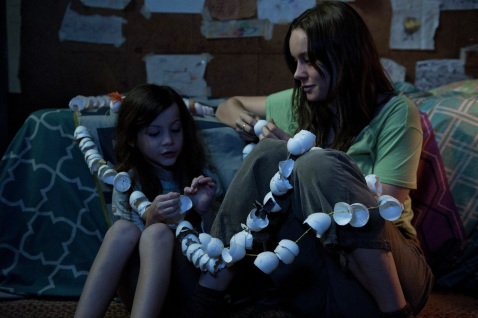
Jack (Jacob Tremblay) is five and he lives with Ma (Brie Larson) in Room, a situation which as far as he is concerned is completely normal. But when Jack turns five, Ma begins to tell him about the world outside of Room, and how she and Jack came to live- as prisoners- inside it.
Lenny Abrahamson’s powerful adaptation of Emma Donoghue’s equally powerful 2010 novel is an account of an unspeakably awful crime told through the eyes of a five-year old child. Jack’s voiceover narration orientates us within his life: he tells us what is real (lamp and light-switch) and what is not (trees), but as the camera bounces around the walls of Jack’s home, this cheerful description is at odds with the grotty and claustrophobic enclosure where Jack and his mother have been forced to live by Ma’s kidnapper (Sean Bridgers), known only to Jack as Old Nick. Room is an example of how truly harrowing subject matter can be discussed in a way which exhibits the full horror of the situation without ever being gratuitous. Seeing through Jack’s eyes softens the hard edges of the story as he absorbs everything with the equanimity of childhood. Having been born in room, he has never known things to be any different.
The impressive achievement of creating a film that deals with terrible circumstances honestly but without voyeurism is in large part due to the extraordinary performances of the two leads. Larson, who is most often seen brightening up daft Hollywood comedies but who delivered an absolutely astonishing lead turn in 2013’s Short Term 12, commands the screen as Ma. Her performance is so communicative that the camera does not need to provide an explicit description of what is done to her- it is evident in her every move and facial expression, and in her interactions with Jack. Ma is torn between the need to protect him and the desire to liberate them both, knowing that in order to do so she must force the knowledge of Jack’s incarceration upon him. Newcomer Jacob Tremblay, too, is a remarkable find, and the mother-son bond between the two characters is utterly believable. Tremblay comes into his own in the latter half of the film, brilliantly communicating Jack’s reaction to changing circumstances and an evolving relationship with Ma.
Emma Donoghue’s screenplay is an elegant distillation of the novel which maintains the effect of telling the story from Jack’s perspective (the novel is entirely written in the first person) without the overuse of the device of voiceover. A downside of the inherently visual medium of film is that the initial gradual reveal of the reality of Jack and Ma’s situation which is a strong (and devastating) element of the book cannot be preserved here. Furthermore Abrahamson, while clearly an expert at getting excellent performances from his actors, has a rather straightforward visual style. However, Danny Cohen’s cinematography is not without some flair. The camera initially bounces around, reflecting Jack’s innocence and childish energy, but becomes increasingly static as his understanding of his situation increases. Another (perhaps unavoidable) weakness is the occurrence of an emotional crescendo around the midpoint that, while allowing the narrative to shift into something more subtle that might be suggested by the film’s first act, also unbalances the pacing slightly, at times making the second half feel overlong.
Despite these reservations it’s hard to see how a better adaptation could have been made. Although at times an extremely touch watch, the story is told with such emotional sensitivity and such perfect performances that it transcends it’s headline-grabbing start point to access something altogether deeper and more affecting.
Verdict: 4/5
Image credit: aceshowbiz.com
Review: The Hateful Eight
Year: 2015
Certificate: 18
Director: Quentin Tarentino
Screenwriter: Quentin Tarentino
Cast: Samuel L Jackson, Kurt Russell, Jennifer Jason Leigh, Walton Goggins, Tim Roth, Demian Bichir, Michael Madsen, Bruce Dern
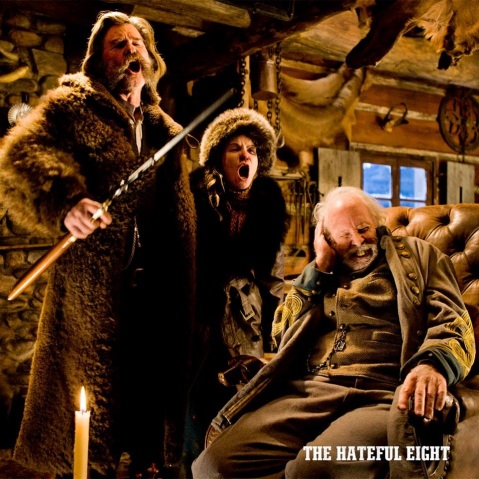
Tarentino returns for his (arguably) eighth feature with a frost-bitten tale of treachery in the outback of post-civil war Wyoming. Bounty hunter John ‘the hangman’ Ruth (Kurt Russell) is on the way to deliver captive outlaw Daisy Domergue (Jennifer Jason Leigh) to Red Rock for the pleasure of watching her hang when the arrival of a blizzard forces his stagecoach to spend the night at Minnie’s Haberdashery en route. Cooped up together under trying circumstances, suspicions begin to run rife between the Haberdashery’s incumbents. Is Chris Mannix (Walton Goggins) really the new sheriff of Red Rock? Why is Domergue so blasé about her situation? And- since this is Minnie’s Haberdashery- just where, exactly, is Minnie?
Tarentino’s trademark fondness for loquacious exuberance shines through, and the dramatis personae is littered with raconteurs who, by and large, feel well-realised and (although they are indeed as hateful as the title suggests) are entertaining to watch. This character-based drama drives the narrative until the splashy final half when everything goes to hell in a tainted coffee tin and the bullets (and viscera) begin to fly in typically hyperbolic style. The cast go all-in, with Samuel L Jackson putting in a commanding performance as Major Marquis Warren, a Union soldier turned bounty hunter who, facing a room partially populated by ex-confederate racists, is determined to give as good as he gets. Jennifer Jason Leigh is also mesmerising as the delightfully despicable Daisy Domergue, her scenery-chewing antics contrasting well with Kurt Russel’s perennially wry John Ruth, to whom she spends most of the film handcuffed.
Although the language and violence is unarguably gratuitous and the film is perhaps a little baggy at just under 3 hours, The Hateful Eight is a surprisingly coherent and entertaining piece featuring a well-told story and exciting performances.
Verdict: 4/5
Image credit: facebook.com/thehatefuleightmovie
Recent Posts
Archives
- September 2017
- February 2017
- January 2017
- November 2016
- October 2016
- September 2016
- June 2016
- April 2016
- March 2016
- February 2016
- January 2016
- December 2015
- November 2015
- October 2015
- September 2015
- August 2015
- July 2015
- June 2015
- May 2015
- April 2015
- March 2015
- February 2015
- January 2015
- December 2014
- November 2014
- October 2014
- September 2014
- August 2014
- July 2014
- June 2014
- May 2014
- April 2014
- March 2014
- February 2014
- January 2014
- December 2013
- November 2013
- October 2013
Categories
- 1961
- 1982
- 1985
- 2010
- 2011
- 2012
- 2013
- 2014
- 2015
- 2016
- 2017
- 2D
- 3D
- Cinema
- Classic Reviews
- Collections
- DVD
- films
- Genre: action
- Genre: animation
- Genre: biopic
- Genre: comedy
- Genre: drama
- Genre: fantasy
- Genre: horror
- Genre: LGBTQ
- Genre: musical
- Genre: period drama
- Genre: sci-fi
- Genre: superheroes
- Genre: thriller
- Genre: western
- Netflix
- Preview Article
- Rating: 1/5
- Rating: 2/5
- Rating: 3/5
- Rating: 4/5
- Rating: 5/5
- Reviewed by: AES
- Reviewed by: SO
- Reviews
- Top 5 List
- Uncategorized
Recent Comments